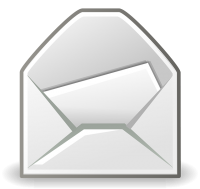 I often hear new radio morning show producers or new podcasters ask for advice on reaching out to guests. Over the last eight years of podcasting, I have found that using email templates and a shared spreadsheet can dramatically streamline the process. Here’s how it works:
I often hear new radio morning show producers or new podcasters ask for advice on reaching out to guests. Over the last eight years of podcasting, I have found that using email templates and a shared spreadsheet can dramatically streamline the process. Here’s how it works:
1. Create a shared spreadsheet for guest bookings.
If you have multiple people working on your show, it’s helpful to create a Google spreadsheet so that everyone on your team can easily log in and see which guests are booked on which dates. For my podcast, The D Brief, we use a Google spreadsheet so that my co-host, Becky, and I don’t have to worry about double-booking guests. We have one tab on the spreadsheet that serves as a calendar for upcoming shows and another that serves as a running list of potential guests that we want to reach out to.
2. Find software that allows you to create email templates.
Writing the same email over and over to solicit guests gets tedious, so I use software that allows me to insert a pre-written email template with a click of the mouse. Because I use Gmail on the Chrome browser, I use the Gorgias Templates browser extension. Outlook has templates functionality already built into its software. If you’re using Yahoo! or another email client, you’ll need to find a solution that works for you. Worst case, you could always save your templates in a text document so that you can cut and past them into your emails, but they are more elegant solutions available if you’re willing to do some research.
3. Brainstorm a list of potential guests.
Who would make a good guest for your show? For my my podcast, The D Brief, it’s anybody involved in the Detroit arts and entertainment scene. When you’re brainstorming, include people that you know you can get on the show, but at the same time, don’t be afraid to shoot for the moon. Our moonshots include famous Detroiters like Jeff Daniels, Jemele Hill, and Kristen Bell. Yours might include Brad Pitt, Kim Kardashian, or Tom Brady. Don’t be afraid to put them on the list.
4. Find their email addresses.
Sometimes, finding an email address is as easy as looking up a website or checking the end of a press release. For bigger names, you may need to subscribe to IMDB Pro or reach out to records labels or talent agencies. When you do find email addresses, add them to your spreadsheet.
5. Send a short introductory email.
 I like to keep the initial outreach very short. People may receive it on their phone, so I don’t want to intimidate them with too many details. The basic gist is this:
I like to keep the initial outreach very short. People may receive it on their phone, so I don’t want to intimidate them with too many details. The basic gist is this:
“We’ve got a show. It’s about _____. You can listen here: [link]. We’d love to have you on as a guest. If you’re interested, please let us know and we’ll send you more details.”
Of course, I clean it up a little bit:
“My name is Seth Resler. I am the co-host of The D Brief, a new podcast about the arts and entertainment scene in metro Detroit. You can hear recent episodes at https://thedbriefdetroit.com.
6. If they respond, send a more detailed invitation.
People rarely say no to my interview requests. They either express interest or simply ignore my emails. Don’t take it personally if they ignore yours; it happens. Over time, you’ll get a feel for how many requests you need to send out to fill your guest slots. If you’re only shooting for A-list celebrities, you may get a 30% response rate, whereas if you’re soliciting local chefs, you may get an 80% response rate.
When somebody does respond asking for more information, give them more details:
- What dates and times are you looking at?
- Is it an in-person or over-the-phone interview?
- How long will the interview last?
- What topics will you cover?
While this email template isn’t as short as the initial outreach, I still try to keep it pretty concise while answering any question that they might have. I close by asking them to pick a date and time that works for them.
Once you’ve sent this email, make a note in your spreadsheet so you don’t forget to follow up if they don’t respond.
7. If they say yes, send an email with specific instructions.
Once the guest picks a date, send them an email (using a template) with all of the details they could possibly need, including:
- For a phone interview, how to call in.
- For an in-person interview, where to go.
- How to prepare for the interview (especially if it is a guest that doesn’t do many).
- If you will take photos, tell them (some guests like to make sure they look good).
- If you need a headshot, bio, or press kit, ask for one.
- A backup phone number in case of any issues.
Again, make a note in your spreadsheet indicating that you sent them instructions.
8. Send a reminder email.
 Either the day before or the day of the interview, send an email (with another template) reminding them of the interview. This can be short, but repeat key details from the previous email, including the time, phone number, or address.
Either the day before or the day of the interview, send an email (with another template) reminding them of the interview. This can be short, but repeat key details from the previous email, including the time, phone number, or address.
9. After the interview, send a follow-up email.
After the interview, send your guest a final email thanking them for coming on the show. If there is a recording or a podcast episode with the interview, include a link and encourage them to share it. Make sure that your social media handles are in the email so they can include them in their posts.
As you can see, there’s a lot of emailing back and forth involved in booking guests. Using email templates can cut down on the workload dramatically, while a spreadsheet in the cloud can keep you organized.
More Digital Tips
- 10 Ways to Promote Your Radio Station’s Mobile App
- 5 Targeted Email Campaigns Every Radio Station Should Set Up
- Use Digital Content to Help Your Radio Listeners Ease Back Into Live Events
- 5 Pop-Up Ads Your Radio Station Should Have on Its Website
- Podcasting Has a Privacy Problem
- A Simple Digital Treat to Thank Your Radio Listeners This Thanksgiving - November 13, 2023
- Interview Questions When Hiring Your Radio Station’s Next Digital Marketing Manager - November 6, 2023
- A Radio Conversation with ChatGPT: Part 2 – Promotions - October 30, 2023





Great information! Very helpful and great tips! That’s one of the things I was struggling with…My initial emails were always long and I was trying to stuff all of the details in the first email, but I totally agree with you about keeping the initial outreach very short! Will be doing this from now on, thanks!